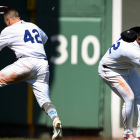
Max Scherzer's new $210 million, seven-year Nationals contract is a huge deal, the largest ever for a free agent pitcher. But exactly how big is it?
While Scherzer -- whose record deal is pending a physical scheduled for Tuesday -- will be paid $15 million a year over the next 14 years according to the agreement, he is only contracted to pitch for the next seven. That means exactly half the deal -- $105 million -- is being deferred to his first seven retirement years, or at least the first seven post-contract years.
While everyone agrees it's a monster deal for the star right-hander Scherzer, there is at least some debate about exactly how much the deal is worth since half the money is deferred and spread over 14 years at no interest. However, the issue is much more complicated than even that.
Since there's no income tax for non-residents in Washington, D.C., $50 million is to be paid in a bonus spread over the 14-year term. Scherzer is said to be planning a move to Florida, in which case he might save up to $20 million in total tax.
Baseball people are technically figuring the deal to be worth about $185 million in present-day value based on the deferrals. However, that assumes a 4 percent interest lost (the amount suggested in the Basic Agreement), which is unrealistic, at least with present bank interest rates much lower than that. So at a base, the deal is probably worth at least $195 million, even before figuring the tax breaks.
And the tax effect is substantial, particularly since $50 million is to be paid in a bonus spread evenly over the 14-year term ($3.4 million per year), and the final $105 million in payments come (exactly half the deal) come after the seven-year term of the deal, meaning it is technically no longer work income. So Scherzer, provided he does move to Florida for convenience (and savings) sake, will be taxed on only the $55 million remaining.
Considering the lost monies through the deferrals and the tax money gained, the deal is probably worth closer to $210 million than $185 million, though it is hard to pinpoint an exact value. Any way you look at it, though, the deal is a home run considering no free agent pitcher has ever gotten more, projections were closer to $175 million, and it represents up to a $66 million gain over the $144 million Tigers offer he spurned in spring. (Of course, he carried insurance and there was some unknown cost to that.)
Considering potential big-market suitors such as the Yankees, Dodgers, Angels and some other big-market teams publicly suggested they weren’t likely to be in the Scherzer mix, it is even more surprising he did quite this well. And as a bonus, he goes from one perennial World Series favorite to the presumed 2015 World Series favorite, depending on what more adjustments the Nats make to their currently stacked rotation.
The 89-year-old Nats-owning Ted Lerner is telling folks he doesn't intend to trade any of the five fine remaining starting pitchers, though Jordan Zimmermann and Doug Fister, the two who are free-agent eligible after 2015, were at least discussed in trades even before the Scherzer signing. There are new rumors former wunderkind Stephen Strasburg could be available, though a couple rival GMs say they expect the pricetag would be onerous to the point of making a trade very unlikely.
Some of the financial information was first reported by Ken Rosenthal of FOXSports.com and Jeff Passan of Yahoo. CBSSports.com first reported Scherzer had a seven-year agreement with the Nationals.
One more thing in regard to the contract:
Folks figured the $155 million Jon Lester Cubs deal was pretty good. So how did Scherzer, who unlike Lester carried the burden of the first-round draft attachment, who is 30 like Lester and has a comparable résumé to Lester (Lester's is actually a bit better considering the World Series record) though perhaps a bit more stuff, receive up to $55 million more than Lester?
That is a question that might never be answered. But while it is fair to say Scherzer probably had a stronger resolve to get the best deal, waiting things out appears to have been a strategy that paid off handsomely.





















